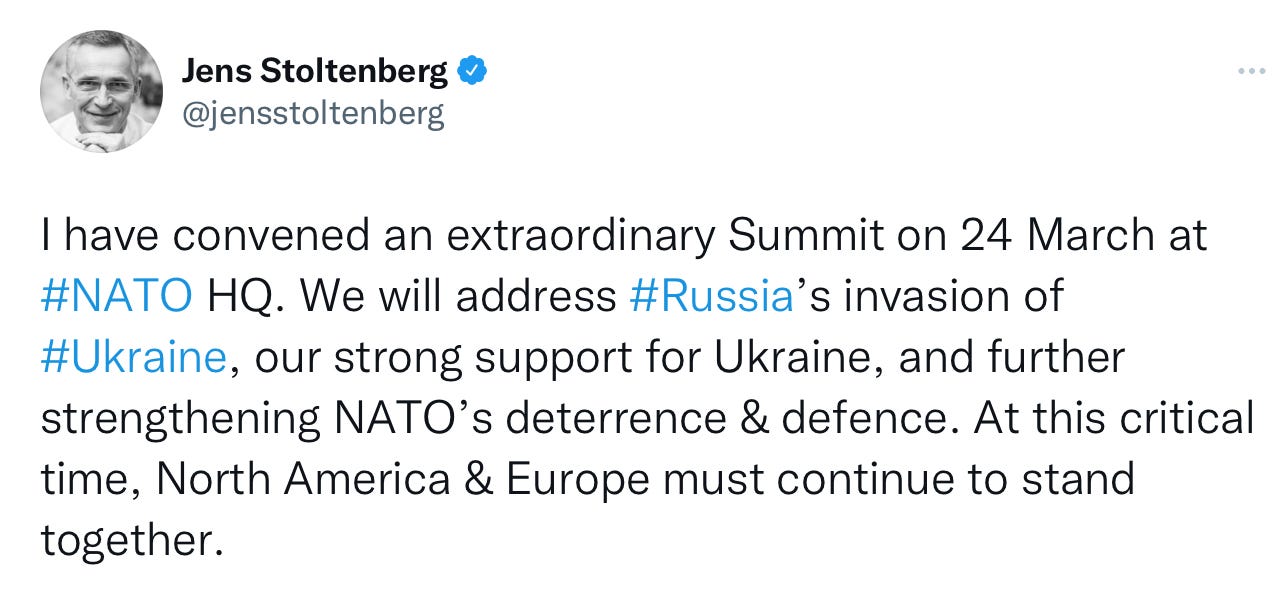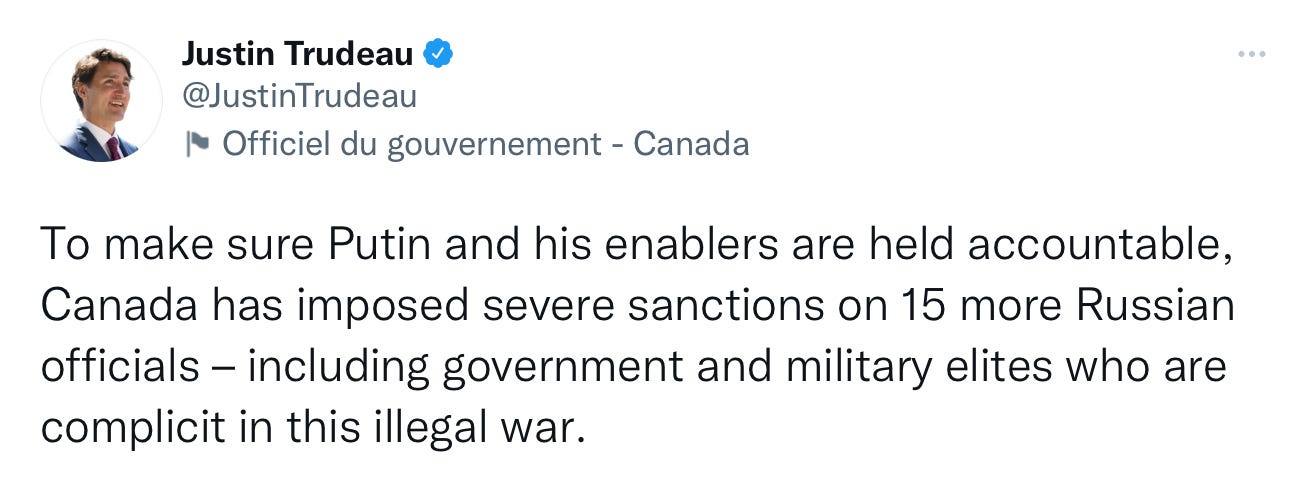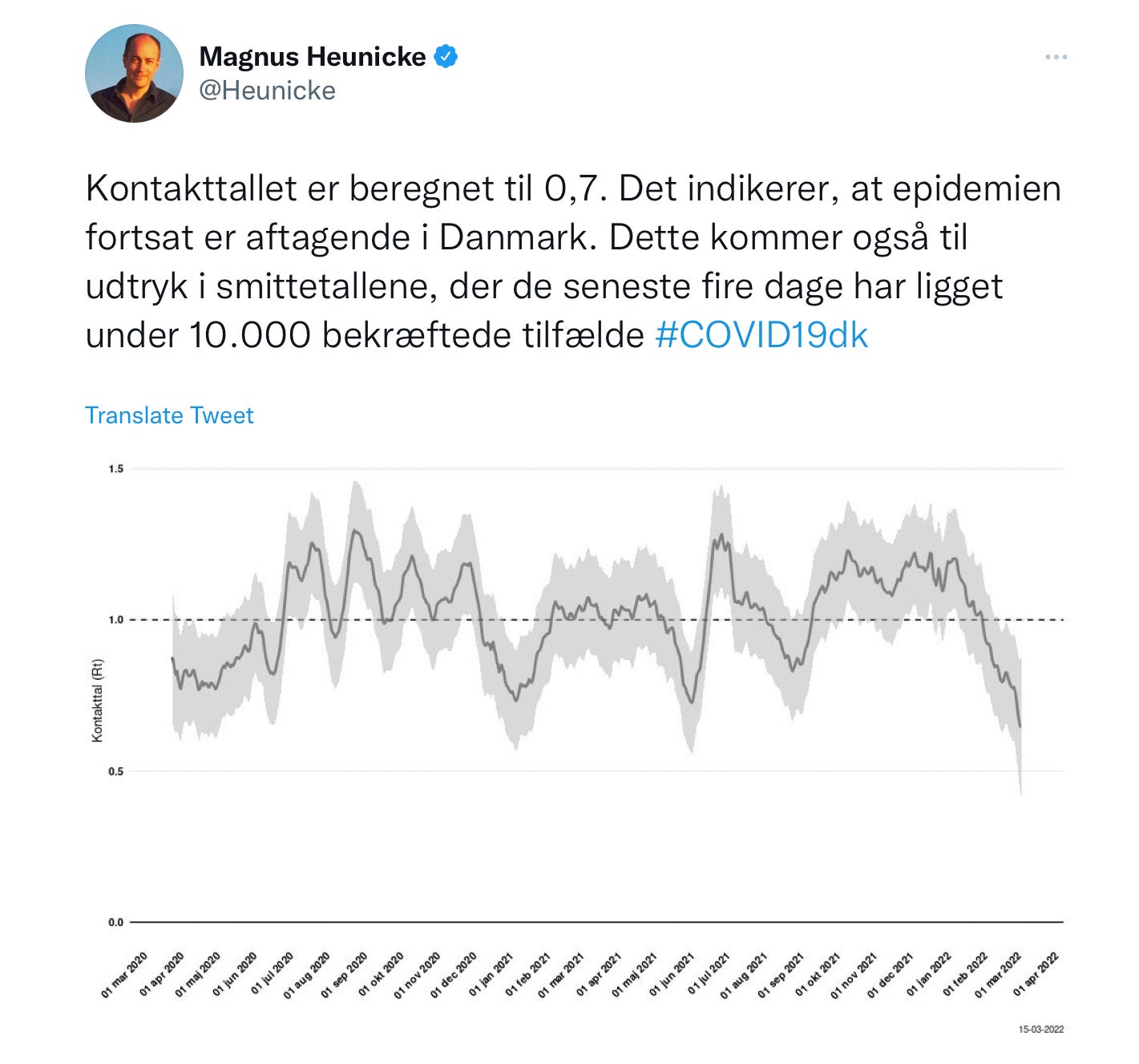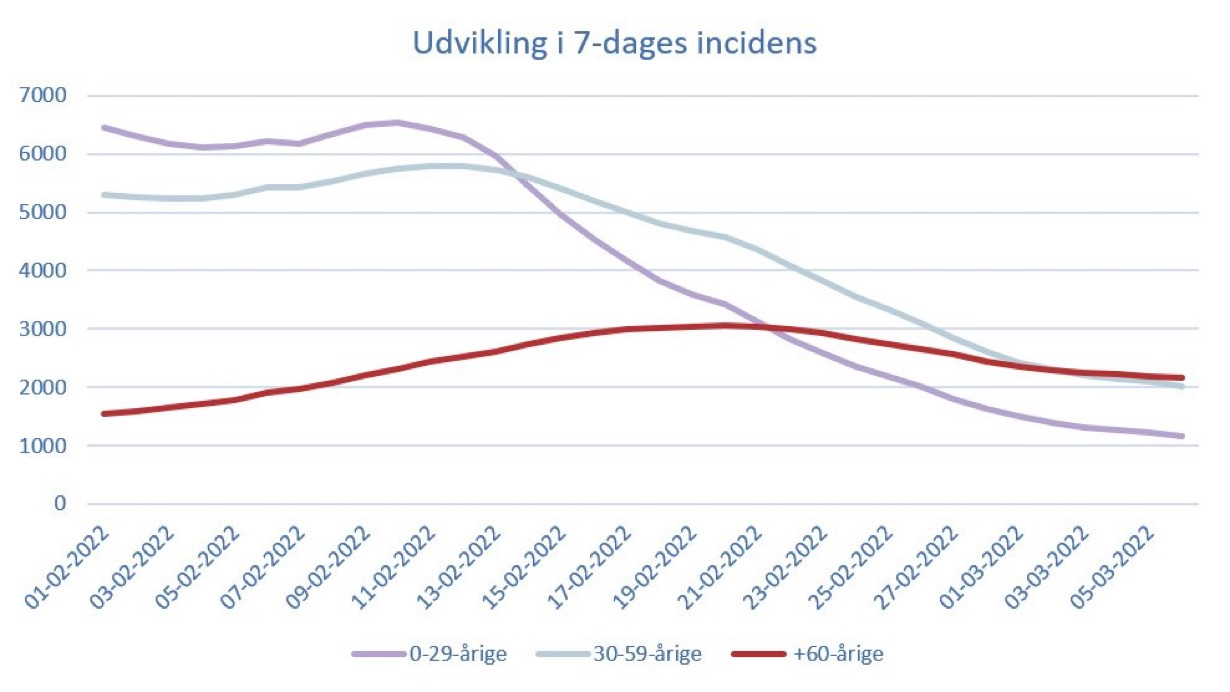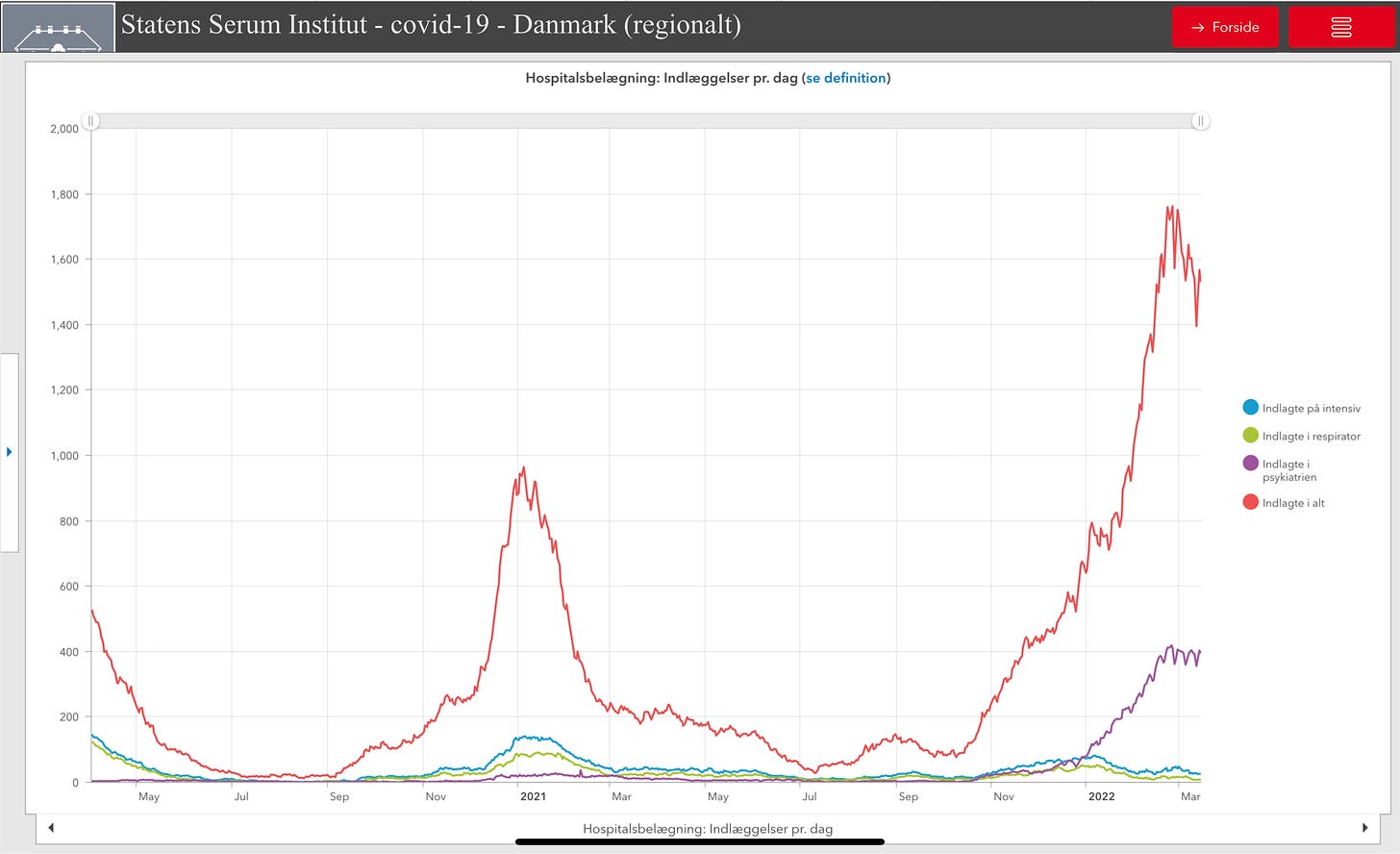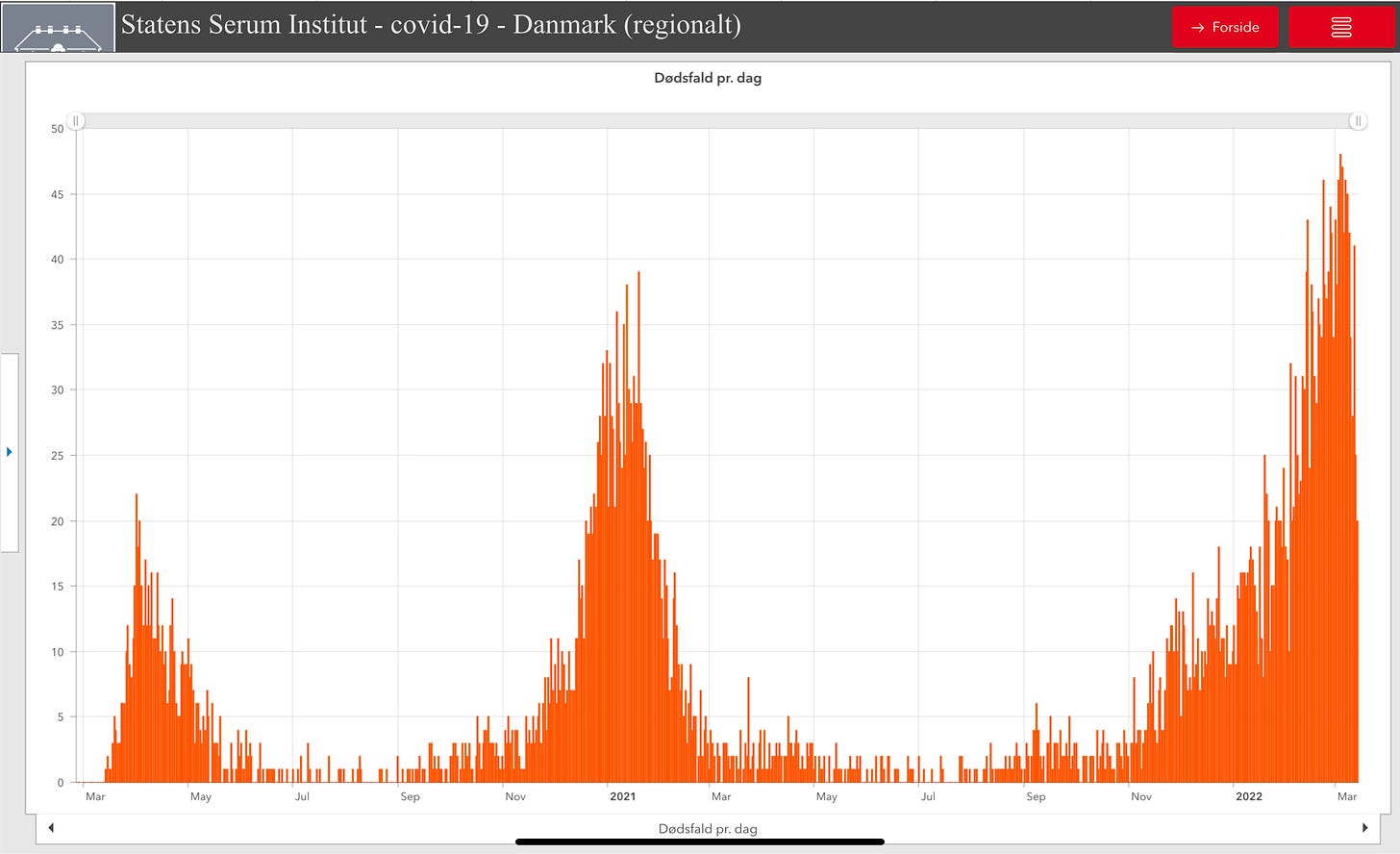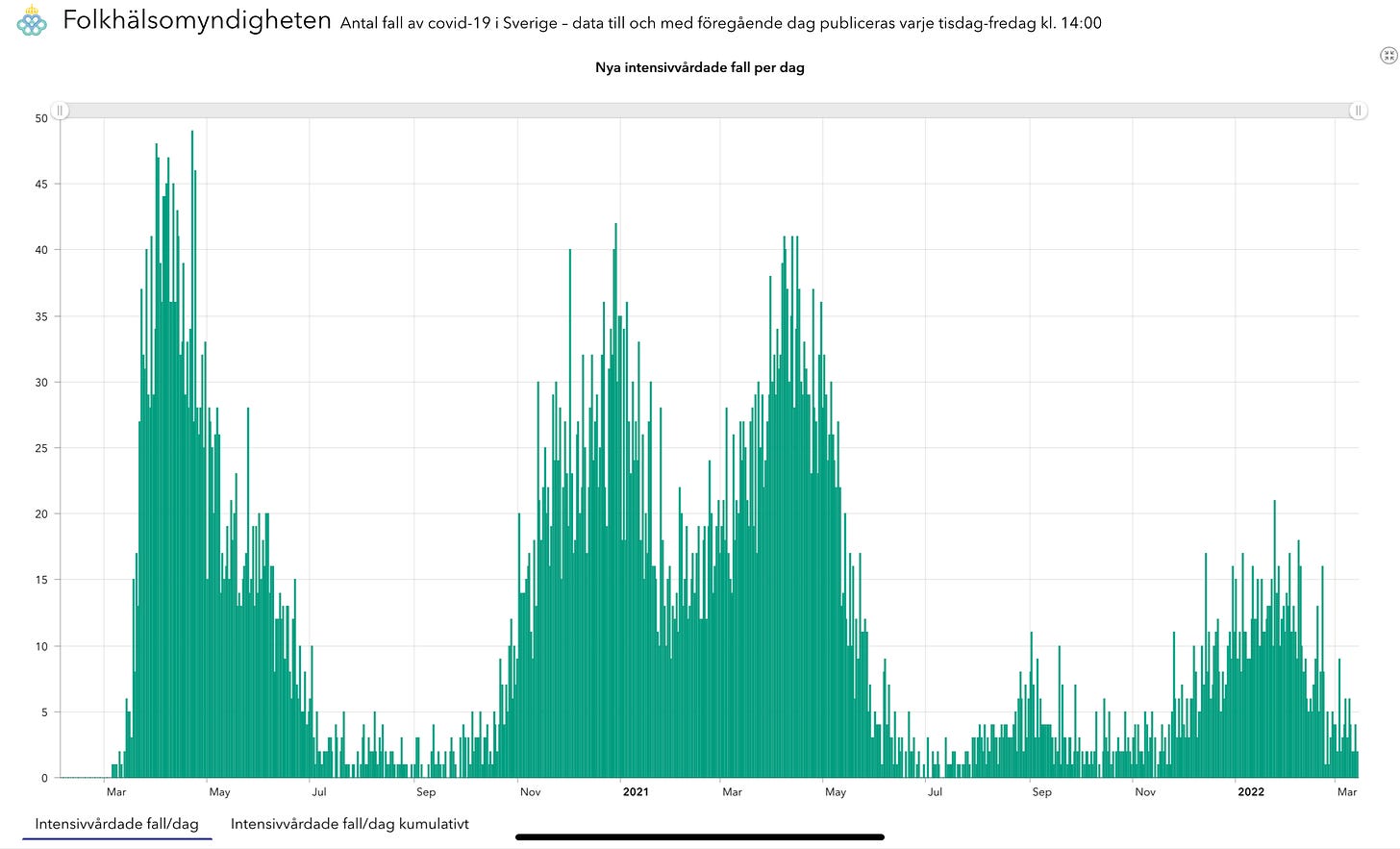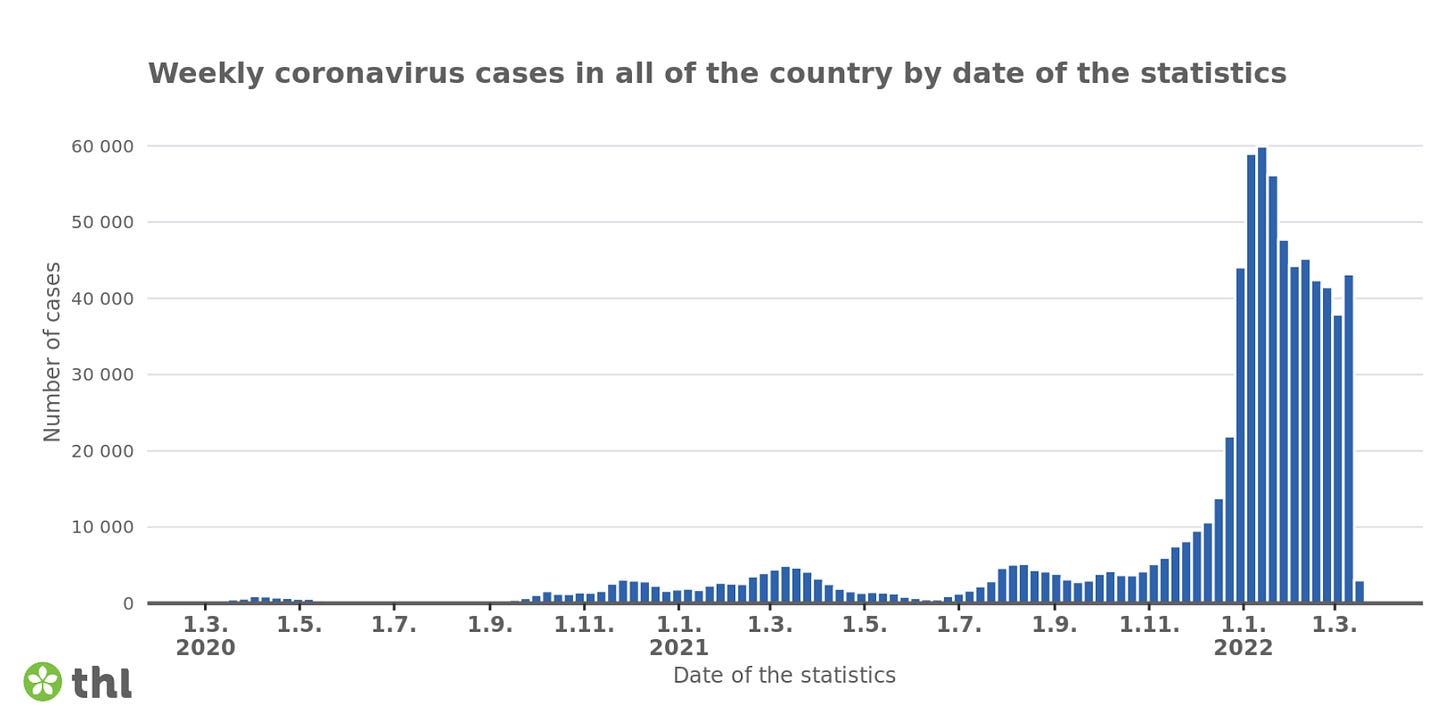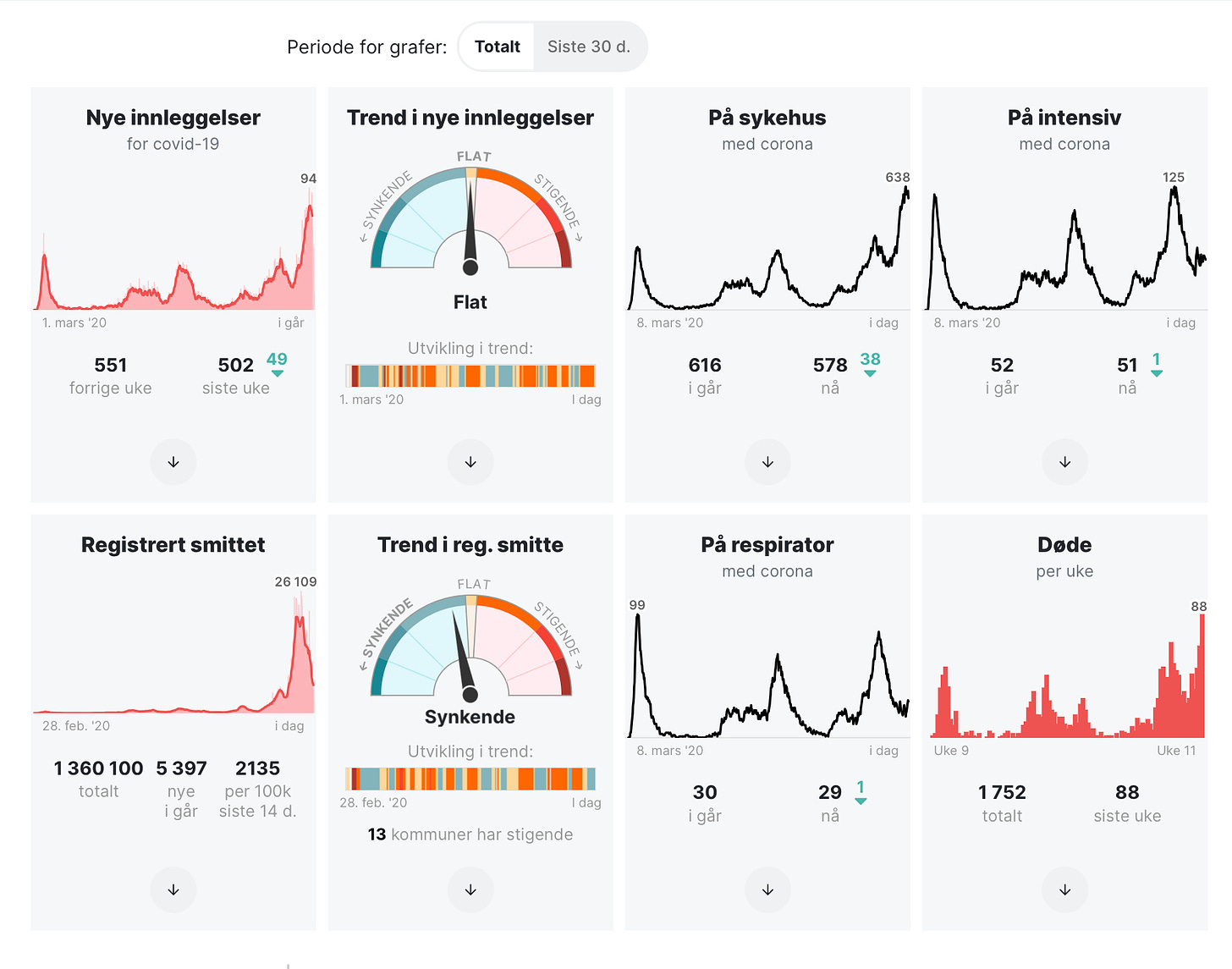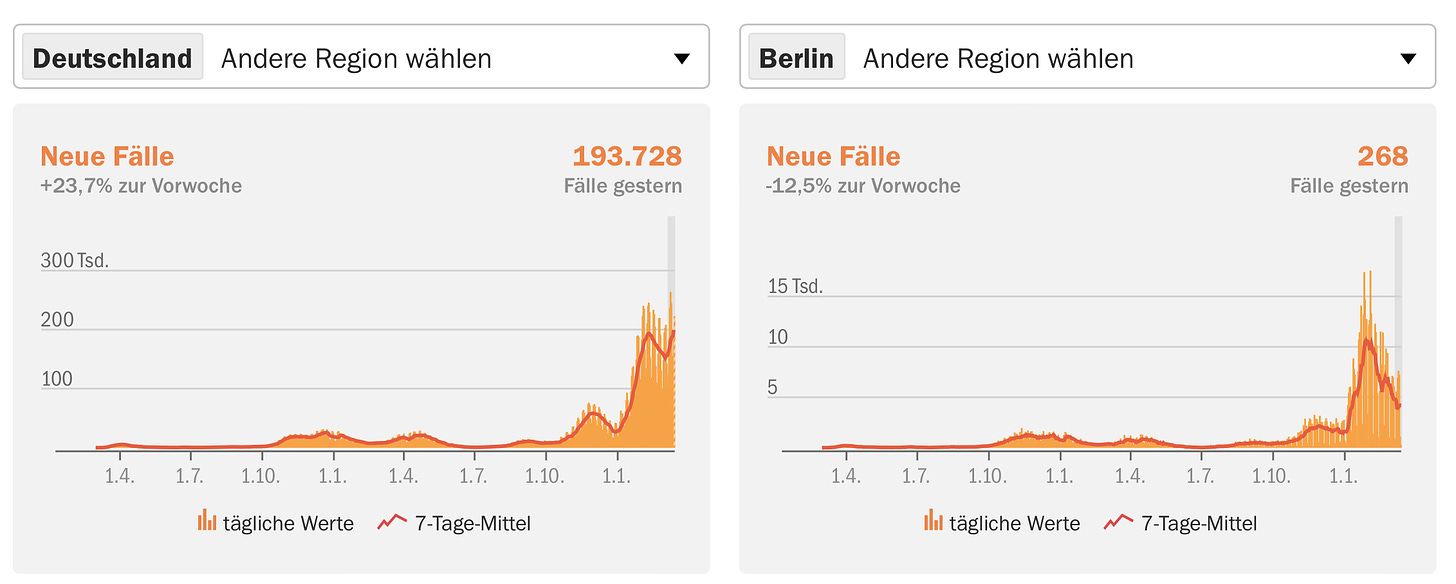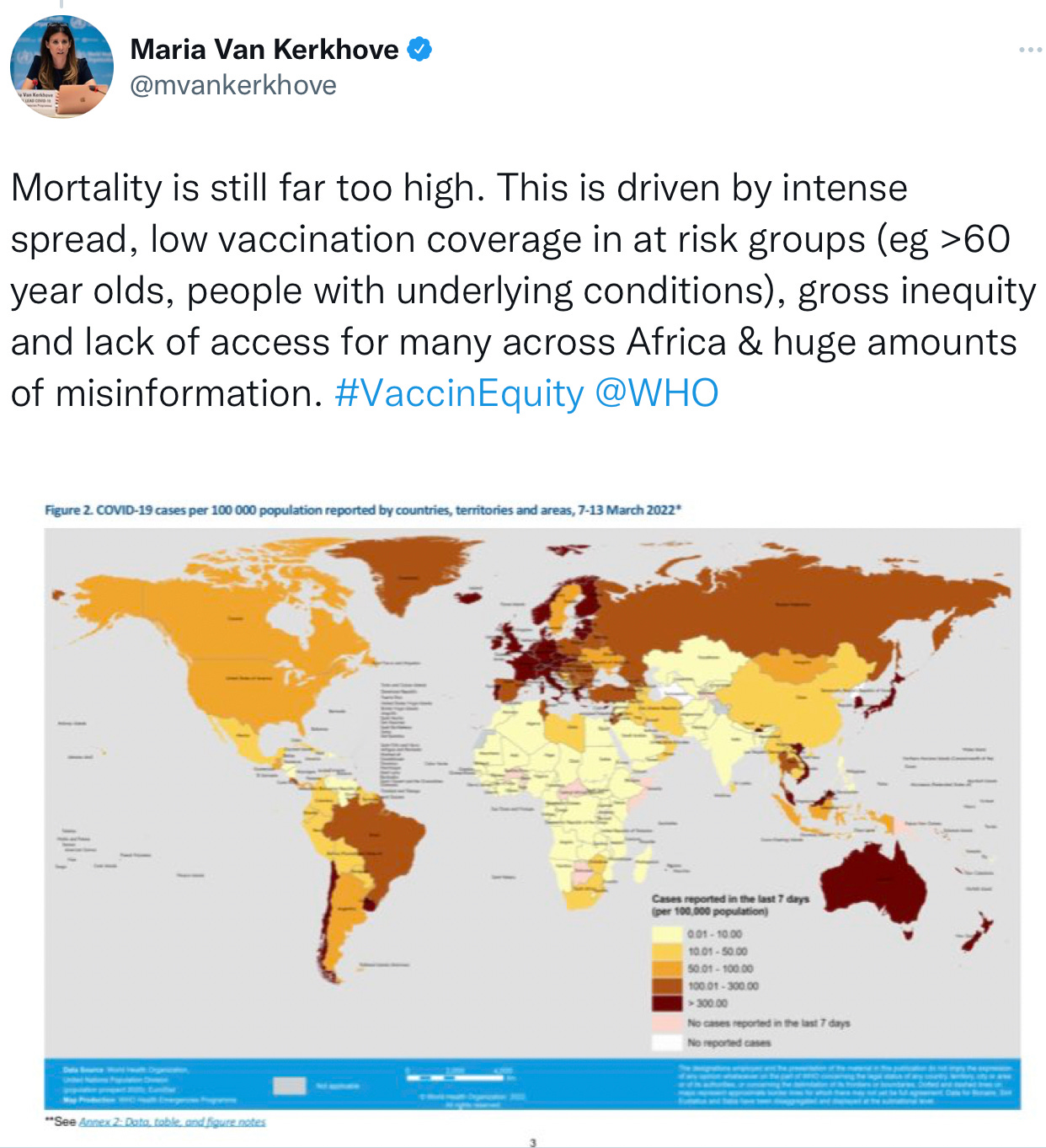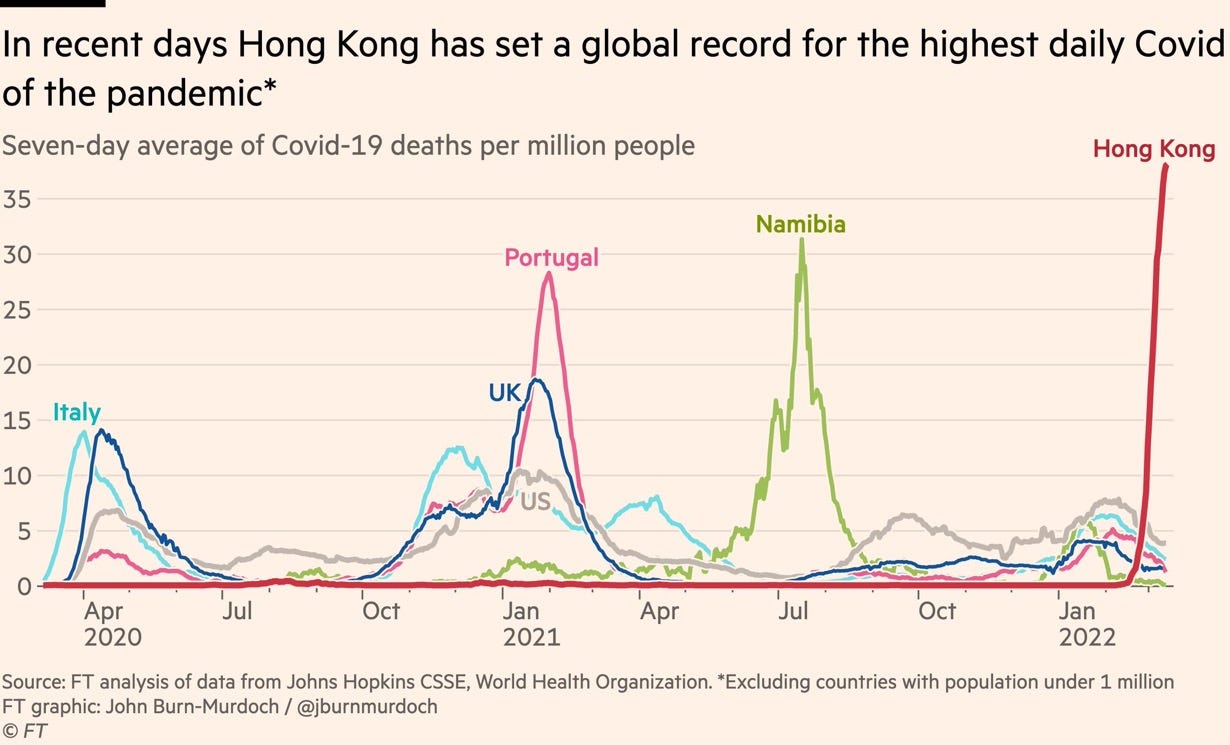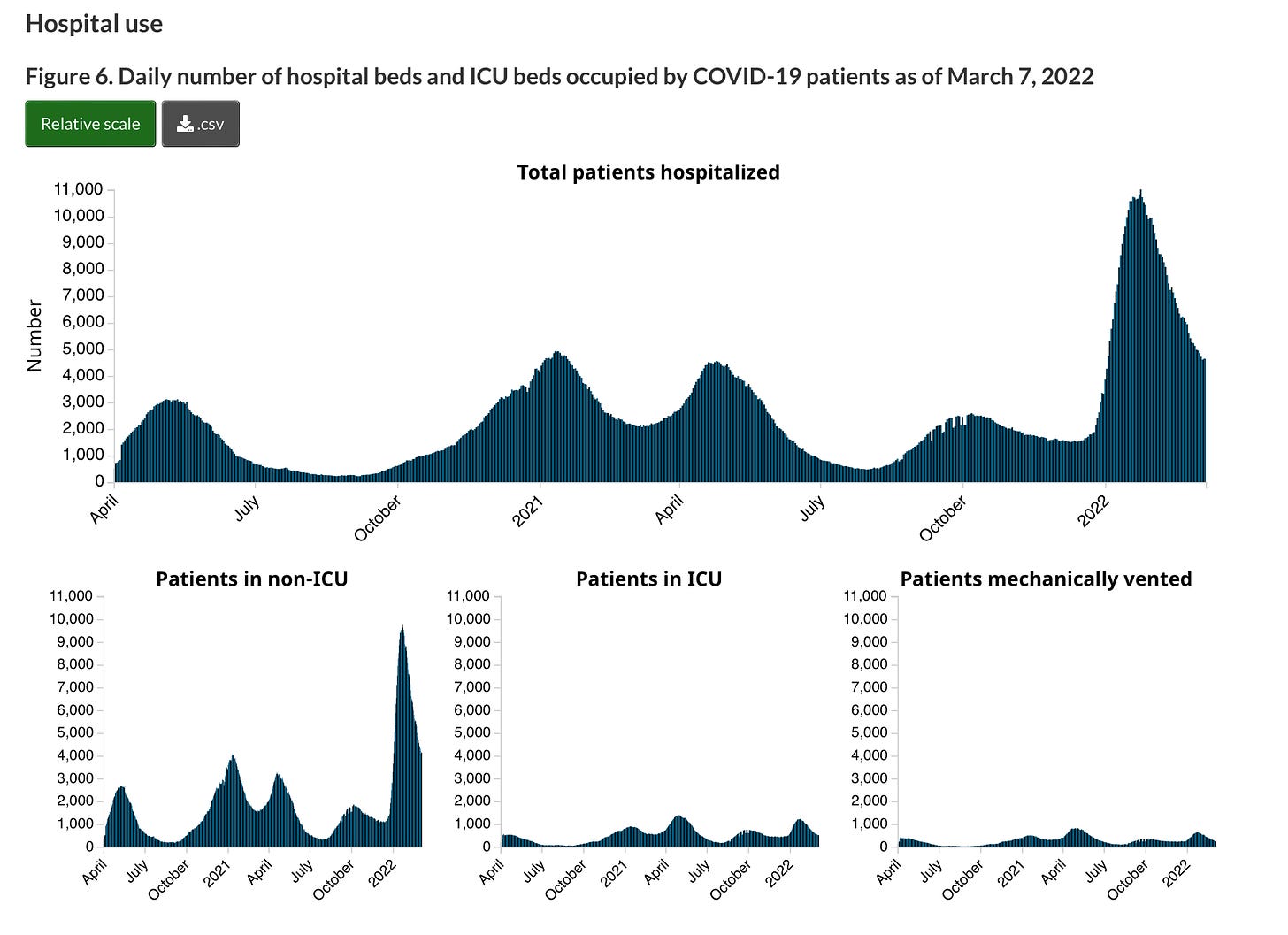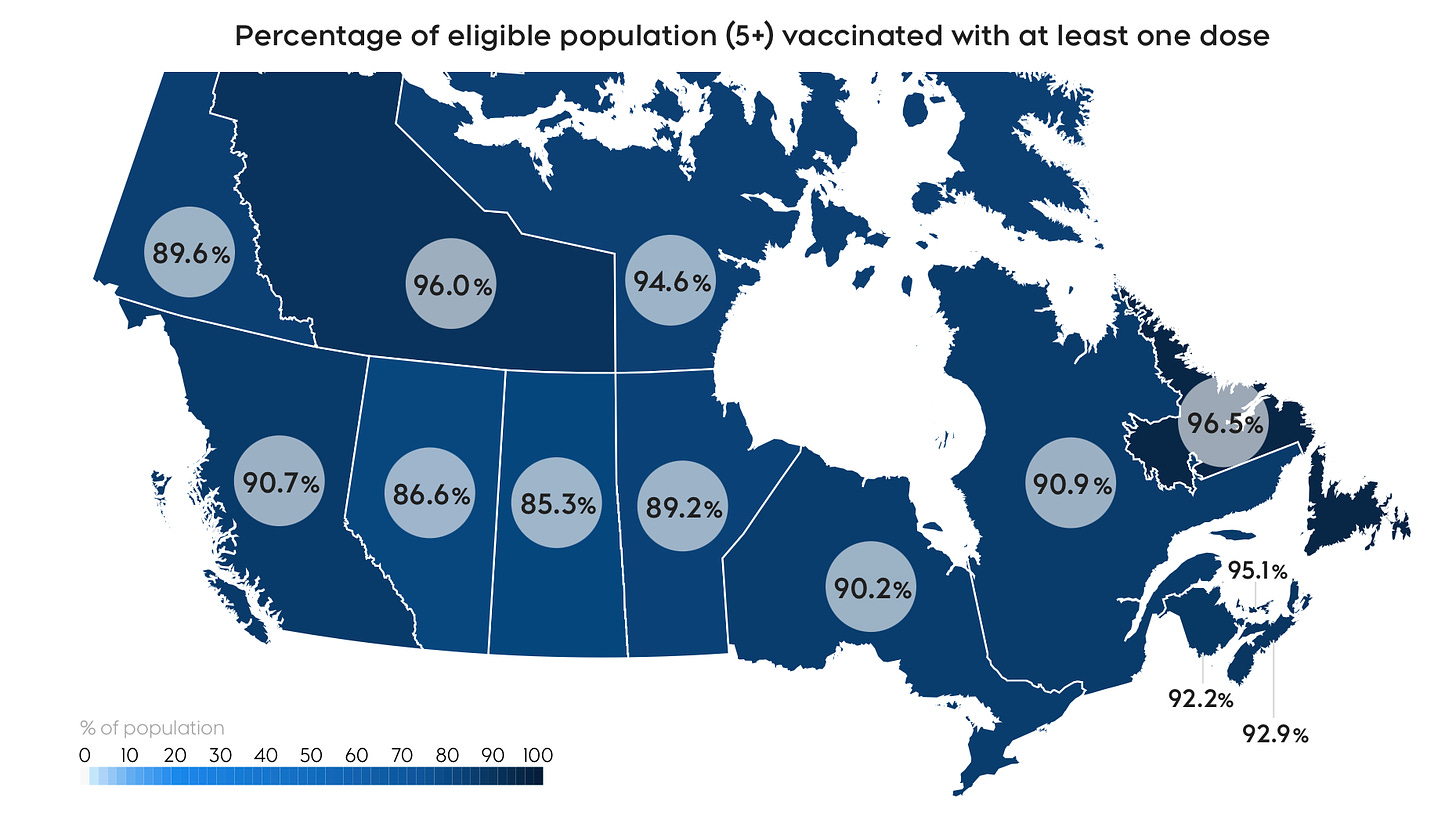The Evening Report - Mar 15
WHO funnels badly needed medicines to Ukraine. Denmark’s declining epidemic.
🇺🇦/ 🇷🇺 War
NATO’s Secretary General has called an extraordinary summit for next week.
United States President Joe Biden will travel to Europe next week to attend the summit.
WHO/ 🇺🇦 🇷🇺
The World Health Organization says it has been working around the clock to ensure there is a flow of medical supplies to countries bordering Ukraine and info the country itself. The WHO says it wants to ensure the urgent medical needs of fleeing refugees can be met.
The WHO says 18 million people have been impacted by the war in Ukraine; 6.7 million of them have been displaced, while nearly three-million people have fled the country. The health agency says the situation is dire with supply chains disrupted; some medical stockpiles in Ukraine have been compromised or are inaccessible; medical supplies are running low, and what hospitals are left are struggling. The WHO says it is working from every angle to try and help.
Since March 5, the WHO has managed to get 600 doses of anti-tetanus medication, 10 tonnes of trauma and emergency surgery kits, 36 tonnes of medical supplies, two ventilators, and 14 tonnes of trauma kits and other essential medicines have been delivered into Ukrainian cities of Lviv and Kyiv. As well, another nine shipments with ten tonnes each containing enough medical supplies to treat 150 trauma patients and 15,000 primary healthcare patients for about three months have been sent to Kharkiv, Dnipra, Mariupol, Mykolaiv, Zaporizhia, and Cherkasy.
The WHO has also now set up a support hub in Poland to monitor the needs in Ukraine and facilitate supply chains of medicine and equipment.
-
The World Health Organization says it has verified 31 attacks on healthcare facilities by Russian troops in Ukraine. Those attacks have resulted in at least 12 deaths and 34 injuries. Two of those who were killed were healthcare workers. The health agency says it is still in the process of verifying other attacks.
“The WHO strongly condemns acts of violence against health care. Every single attack deprives people of life-saving services. Attacks on health care are violations of international humanitarian law and human rights.”
🇩🇰/ 🇵🇱 🇺🇦
A shipment of vaccines for Ukrainian refugees should arrive in Poland tomorrow. It is from Denmark’s Statens Serum Institut. There are 133,145 doses in all, with 40,040 of those doses being MMR vaccines to protect against measles, mumps, and rubella. The remaining 93,105 doses are DiTE vaccines to protect against diphtheria and tetanus. The vaccines were sent by a refrigerated truck, which left Denmark for Poland on Monday.
Deputy Director Ole Jensen:
“Right now the Ukrainians are in a very difficult and unmanageable situation due to Russia's war against Ukraine. Many have had to flee the country, and the recipient countries lack many different necessities, including vaccines. That is why we are happy to be able to make our contribution to helping.”
Last week, the SSI dispatched 1,200 doses of anti-tetanus medication to Poland for use on the front lines of the refugee crisis.
🇸🇪/ 🇫🇮
Usually done in secret, but now the Swedish and Finnish defense ministers have opened the forbidden door on a joint exercise in war games.
Swedish Minister of Defense Peter Hultqvist spoke to TT:
“We go through how we would jointly handle a crisis situation that could lead to war.”
While the two ministries revealed the exercise was based on a fictional scenario revoking around a conflict in the Baltic Sea, further details were kept under wraps. Although Hultqvist said that Russia’s invasion of Ukraine “has had an effect.”
While having a ministerial level war simulation is not unusual, this is the first time this has been publicly disclosed albeit with very few details.
“We wanted to show how established Finnish-Swedish cooperation is at both the political and military levels. Exercises of this type strengthen our countries defense capabilities and create an increased understanding of the opportunities and possible challenges associated with joint military operations.”
🇳🇴/ NATO
30,000 troops, 200 aircraft, and a large contingent of naval vessels from 25 different countries have begun NATO’s ‘Cold Response’ military exercise. The exercise is being hosted in Norway and will simulate an NATO article 5 response.
Allied Air Command Commander General Jeff Harrigian:
“Exercising together is how we optimize what each of us brings to the fight. We are committed to the collective defense of all NATO nations. Integrating and training with our allies and partners allows us to exercise our combined capabilities while deterring aggression against NATO."
Military exercises will include wilderness marches, live-fire drills, jumping into freezing lakes, naval drills, and fighter jets practicing bomber escort procedures.
It is worth noting a Russian naval frigate showed up to shadow the maneuvers.
🇵🇱/ 🇷🇺 🇺🇦
The Prime Minister of Poland wants to bring the hammer down on a huge swath of Russian assets in Europe.
Prime Minister Mateusz Morawiecki per Eastern European news outlet NEXTA:
“Our call is to freeze assets of the Russian state completely, confiscate these assets, freeze assets of Russian oligarchs, businessmen, politicians, and others. Let those assets serve the innocent people who were attacked, let them serve reconstruction."
🇨🇦/ 🇷🇺 🇺🇦
Ukrainian President Volodymyr Zelensky received a three minute long standing ovation from Canadian parliamentarians as he addressed the House of Commons on Thursday in a speech delivered remotely. Zelensky thanked Canada for its contributions of medicine, equipment, and weapons, but also urged them to do more. He pleaded for Canada to push for NATO to impose a no-fly zone over Ukraine.
Russia wasn’t happy as during Zelensky’s speech it announced sanctions against pretty much every federally elected Canadian politician. The Russian foreign ministry added just about everyone from Prime Minister Justin Trudeau on down to a ‘black list’ banning them from entering Russia. Airspace in Canada, the United Kingdom, the United States, across the EU, and in other countries has been closed to all Russian aircraft, meaning no one could go to Russia anyway, even if it was a travel destination of choice, which at this point it is decidedly not.
Canada seems to have shrugged off the sanctions and announced another batch of their own to add to the pile on Russia.
You can find a full list of all 15 Russian individuals facing these new sanctions HERE.
So far, Canada has tabled sanctions on almost 500 people as well as industry and other Russian entities over the invasion of Ukraine.
💉🦠Russia
Pharmaceutical giant Pfizer says it stands against Russia’s invasion of Ukraine “and the brutal situation it has created.” The company says it has decided on a course of action that will ensure humanitarian access to its COVID vaccine and other medicines into Russia. However, Pfizer emphasizes this is not business as usual and it will, effective immediately, donate all profits from its Russian subsidiary “to causes that provide direct humanitarian support to the people of Ukraine.” This will be in addition its other donations in support of Ukraine.
“Pfizer concluded that a voluntary pause in the flow of our medicines to Russia would be in direct violation of our foundational principle of putting patients first. Ending delivery of medicines, including cancer or cardiovascular therapies, would cause significant patient suffering and potential loss of life, particularly among children and elderly people.”
The pharmaceutical company will also no longer initiate any new clinical trials in the country or recruit new trial participants from Russia. It will also work to move all ongoing clinical trials in Russia to “alternate sites.”
“These decisions align with our patient-first values and ensure that every dollar of profit derived from Russia will strengthen Ukraine and its people as they continue to valiantly defend their nation and freedom from this unprovoked and unjustified attack.”
🦠Pandemic🦠
🇩🇰
Denmark’s Health Minister Magnus Heunicke says the COVID contact number (reinfection rate or RO) has dropped from 0.8 last week to 0.7 this week.
“This indicates that the epidemic is still declining in Denmark.”
He adds infection rates have been under 10,000 for the last four days. But it is worth noting they have also been very underreported due to a major decline in testing numbers.
Heunicke says COVID wastewater surveillance, a more reliable pandemic barometer, is also showing a declining infection activity trend. He says since peaking in mid-February, virus levels have declined in all five of Denmark’s regions.
-
In Denmark ,COVID hospitalizations (1,531) have dropped (-36) while the number of severe infection cases in an ICU (26) is unchanged and of those on a ventilator (7) numbers dipped (-2). Infection admissions to a psychiatric ward (395) are down (-8).
-
Denmark reported 9,947 infections, including 527 reinfections, and 36 more coronavirus deaths in the last day.
Yesterday, there were 45,066 total corona tests done, of which 43,808 were PCR tests equaling a positivity percentage of 22.70%.
-
On the vaccination front, there were just 702 booster doses administered yesterday as the inoculation effort trudges along.
To date, 82.4% of the total population have one vaccine dose, 80.9% have two, and 61.3% have a booster. These numbers haven’t changed in a while.
-
A Danish scientific and humanitarian foundation has teamed up with the Bill & Melinda Gates Foundation, and a group called Open Philanthropy to tackle the next pandemic. The group’s goal is to accelerate the discovery and development of antiviral drug candidates that can be produced quickly and delivered equitably across the globe the next time a pandemic strikes.
The global initiative aims to accelerate the discovery and development of antiviral drug candidates that can be rolled out quickly and with equal access the next time the world is threatened by a pandemic.
The Novo Nordisk Foundation, Open Philanthropy, and the Bill & Melinda Gates Foundation plan to raise an initial DKK 90-million (about $17-million Cdn) in funding for the initiative. It will be called Pandemic Antiviral Discovery (PAD) and it will help researchers identify and develop antiviral drug candidates up to phase 2 of clinical trials. The focus must be focused on viruses posing a pandemic risk including coronavirus, paramyxovirus, and orthomyxovirus. Those are the three virus families posing the greatest threat of churning out a strain that could threaten the world.
Novo Nordisk Foundation CEO Mads Krogsgaard Thomsen
“The COVID pandemic is a reminder that the world needs to invest in new tools to combat future health threats. We can not wait to start developing them until the next pandemic strikes."
The group emphasizes that the developing world is most at risk for major outbreaks and pandemic level contagion, making it vital a cheap and easy produce antiviral drug be ready to go. The group says the COVID pandemic has underscored the downfall of vaccination inequity and that you cannot achieve global health security by thinking in silos.
CEO of Global Health at Bill & Melinda Gates Foundation Trevor Mundel:
“The COVID pandemic will end sooner or later, but the need to invest in the tools necessary to prevent and stop pandemics will only become more and more. If we are to be prepared for the next pandemic, it is important that we ensure that we have antiviral drugs that can be used at short notice and at no great cost to the people who need them.”
🇸🇪
Sweden had 76 more corona deaths and added another 3,677 infections (wildly underreported) since Friday’s update.
ICU numbers (40) are down (-14).
So far, 86.9% of the population 12 years old and older have one dose, 84.6% have two, and of those 18 years old and older 61.4% have a booster.
-
While hospitalizations improve in Sweden’s capital region, the coronavirus is still making its presence felt. Region Stockholm says it has 308 COVID patients in hospital, a drop of 76 compared to a week ago.
Chief Physician Elda Sparrelid says all of the region’s hospitals have returned to normal operations.
“It is gratifying that the number of COVID patients is decreasing in inpatient care. However, 308 patients are still being cared for, of which 13 are in intensive care, which places high demands on healthcare workers. This shows that the infection remains at a high level and that there is every reason to go get vaccinated.”
Sparrelid says hospitals are now working to tackle a backlog of procedures that were postponed during the pandemic. Health facilities are also preparing for the possible influx of Ukrainian refugees who will need medical care.
The region had 33 pandemic deaths in the last week but notes the number is underreported due to a technical issue preventing the reporting of COVID deaths in senior care homes.
-
Sweden’s national vaccination week is in full swing in Southern Sverige. Region Skåne says there are 130 vaccination sites all up and running. The region says there are several places where the vaccination rate is still too low. One of those areas is Rosengård in Malmö.
Vaccine Coordinator Per Hagstam:
“That the restrictions have been lifted is not the same as the virus being gone. COVID is still spreading in society and you can not know in advance how sick you will get if you are affected. That is why we make it extra easy for everyone in Skåne to get vaccinated.”
On top of brick-and-mortar sites, the region also has a vaccination bus touring the region offering a mobile service. It is also putting on special clinics targeted directly at people who have a fear of needles.
-
Infection pressure in Region Skåne is slowly easing, but the good news is being tempered by some warning signs. The region says while infections and hospitalizations have been decreasing it has been slow and in some cases it actually looks to be leveling off.
Infection Control Doctor Eva Melander:
“The spread of the infection has decreased, but it is relatively slow. You should be aware that COVID is still common and that you can be infected. There are a few other respiratory viruses circulating right now.”
The region says it has a positivity percentage of about 15%. Of particular concern are a number of new infections in care homes.
🇫🇮
Finland registered 6,110 infections and two more virus deaths in the last day.
COVID hospitalizations (859) are unchanged.
To date, 79.4% of the total population have one vaccine dose, 75.6% have two, and 50% have a booster dose.
-
A third dose of a COVID vaccine provides excellent protection among the elderly. That is according to the latest numbers from the Finnish Institute for Health. The agency says vaccine efficacy rose to over 95% among seniors 70 years old and older after having a booster dose. The strong protection remained in place for at least two to three months.
-
COVID-related restrictions have expired in Southern Finland. The Regional State Administrative Agency decided not to renew them and subsequently, as of Wednesday restrictions have all ended. Health agencies in Southern Finland have reported plateauing hospitalization numbers and ICU numbers have diminished. As a result, local government agencies felt an extension of the existing restrictions was not warranted.
🇳🇴
In Norway, COVID hospitalizations (578) are down (-38) while the number of severe infections in an ICU (51) and of those the number on a ventilator (39) also inched downward (both -1).
Norge had no new pandemic deaths and added 8,217 infections (underreported).
So far, 80.3% of Norwegians 12 years old and older have one dose, 74.6% have two, and 53.8% have a booster dose.
-
A severe COVID infection can trigger anxiety and depression that lasts long after recovery. That is the finding of a study from the Norwegian Institute of Public Health. The study involved 250,000 people responding to a questionnaire across the four Nordic countries as well as Estonia and the United States. Of those, 1,600 reported infections so severe they were bedridden for at least seven days. Compared to the people in the group who had never been infected, rates of anxiety and depression were much more frequent among those with severe COVID cases.
NIPH Senior Researcher, and study first author, Helga Ask:
“The risk of suffering from depression after 16 months was almost twice as great among those who lay in bed for a week with COVID as in the rest of the population: 20.2% versus 11.3%.”
What researchers don’t know is why a severe coronavirus infection can lead to such long-lasting mental health battles.
“We do not know why this group has increased its risk. One possible reason may be that they still have COVID symptoms long after they became ill and recovered.”
Symptoms of anxiety and depression were measured through several questions in the surveys. Among other things, the participants were asked to what extent they felt nervous and anxious, if they had difficulty relaxing, and if they felt down, tired and lacking in energy. Previous research has shown that inflammation and infection can be linked to the development of mental disorders, especially depression. The disorders can also continue even if the inflammation has disappeared.
🇩🇪
Germany recorded 198,888 infections and it added another 283 pandemic deaths as total to date COVID fatalities push closer to 100,000.
It added 2,070 hospitalizations, while intensive care numbers (2,261) jumped (+68). As a percentage of all ICU beds in the country infection patients are taking up 10.3%.
To date, 76.5% of the total population have one dose; 75.7% have two doses, and 57.9% have a booster dose.
🇫🇷
Despite increasing COVID numbers, France has lifted most of its coronavirus restrictions. Vaccine passports are no longer required to eat in restaurants, go into bars, see a movie, or use interregional transportation. Proof of vaccination, recent infection recovery, or a recent negative test are still required to go into a hospital or nursing home.
Mask mandates in most situations have also been abolished. The exceptions are on public transit and inside hospitals, where masks must still be worn.
WHO🦠
The World Health Organization is reporting that Omicron-driven infection waves are rising again. The global health agency says in three of the six global health regions, COVID numbers began to march back upward. In the Western Pacific Region infections increased by 29%. The African region by 12%. In Europe, cases rose by 2% as infections began rising again in places like Germany, Austria, and Italy.
The WHO says globally infection numbers that have been on decline since the end of January have reversed course, increasing by 8% week to week. Last week there were 11-million new infections and 43,000 pandemic deaths.
Epidemiologist, and WHO COVID lead, Maria Van Kerkhove says the WHO recognizes the “tremendous desire to move on” but adds the pandemic is not over no matter how much we want it to be. Kerkhove says the Omicron variant “is still spreading at an intense level.” She says in the last 30 days of all the positive sequenced tests reported from around the world, 99.9% were either the Omicron variant or an Omicron sub-strain.
“Increasing cases will occur where measures are lifted even in the context of high vaccination coverage this shouldn’t be a surprise as vaccines are incredibly effective at reducing severe disease and death, but not infections.”
Kerkhove urges people to get vaccinated and for inoculation efforts to be redoubled in trying to reach seniors over the age of 60 and other vulnerable populations.
“Each country is facing a different situation with a unique set of challenges, but the pandemic is not over. We must remain vigilant and continue to vaccinate, test, sequence, care for patients, protect our health workers, ventilate, adapt, and adjust population interventions as needed. We need strong surveillance to detect COVID variants so that globally we can adjust interventions as needed. Now is the time to enhance the systems we put in place, not dismantle them.”
🇭🇰🦠
After keeping the pandemic at bay for two years, the Omicron variant is now providing a cautionary tale in Hong Kong as numbers go through the roof. Hong Kong is seeing vertical infection and fatality curves with a COVID situation now reminiscent of some of the horrors unleashed on countries like Italy in the spring of 2020.
The Financial Times has done a deep dive to try and understand why, two years into the pandemic, with a global vaccination campaign underway for over a year, that Hong Kong is now reeling. It is a good article and you can find it HERE.
It boils down to vaccinations, or lack thereof, and especially among the elderly population. When Omicron crashed into Hong Kong, more than two-thirds of seniors 80 years old and older had still not been vaccinated. In Hong Kong care homes the situation is tragic with more than 1,000 COVID deaths among vulnerable seniors in care in a matter of days.
It also turns out that slamming the door on COVID and maintaining an almost negligible level of infections for two years has also had a major negative impact. Unvaccinated populations have almost no immunity to any degree from previous infections negating secondary levels of protection.
Another wrinkle that exacerbated an already horrific situation was that in Hong Kong and elsewhere in Asia the Chinese Sinovac vaccine was widely used. As it turns out, Sinovac is much less effective than the mRNA vaccines (Pfizer and Moderna) in protecting against symptomatic infections.
It isn’t just Hong Kong either, as mainland China has around 15 million seniors over 80 who are not vaccinated. This comes as the Chinese government locks down huge cities with tens of millions of people in them as Omicron cases explode.
South Korea, Vietnam, Japan, and Thailand are all also seeing infection waves driving numbers up to record highs.
🇨🇦
Hospitalization numbers continued to trend downward across Canada in the week running from February 28 to March 7. According to the Public Health Agency of Canada, the total number of infected patients occupying hospital beds declined from 5,136 to 4,645. Regular COVID admissions fell by 426 to 4,140 beds occupied in the same week. The number of COVID patients in intensive care also edged down, falling 65 to 505 beds occupied. The number of severe infection cases on a ventilator also edged downward, going from 291 to 245.
Canada added 3,496 COVID infections (very underreported) and suffered another 47 coronavirus deaths yesterday, pushing total to-date pandemic deaths to 36,944.
-
So far the Canadian vaccination effort has administered 32,269,436 1st doses (84.40% of the total population) while 31,048,366 people (81.20%) have two doses, and of those 17,893,110 people are fully vaccinated with three doses.
A number of provinces have moved to updating COVID statistics just once a week. Some are reporting on Tuesdays, others on Wednesdays, and some are doing it on Thursdays. In order to avoid patchwork reporting, we too will now offer a pandemic snapshot of the provinces just once a week, on Thursdays.




